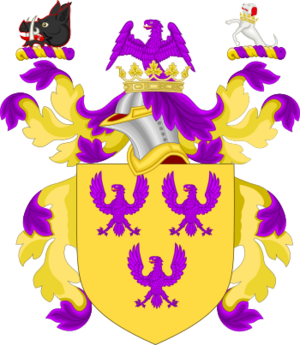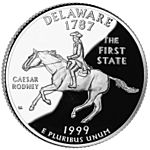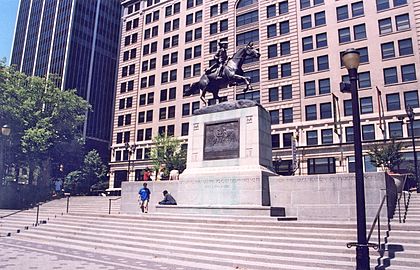Caesar Rodney facts for kids
Quick facts for kids
Caesar Rodney
|
|
|---|---|
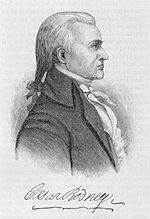
20th-century image; no contemporary portrait exists.
|
|
| 4th President of Delaware | |
| In office March 31, 1778 – November 6, 1781 |
|
| Preceded by | George Read |
| Succeeded by | John Dickinson |
| Continental Congressman from Delaware |
|
| In office August 2, 1774 – November 7, 1776 |
|
| Personal details | |
| Born | October 7, 1728 Kent County, Delaware Colony |
| Died | June 26, 1784 (aged 55) Kent County, Delaware |
| Resting place | Kent County, Delaware |
| Political party | Independent |
| Profession | politician, lawyer |
| Signature | |
| Military service | |
| Branch/service | Delaware Militia |
| Rank | Major General |
| Battles/wars | |
Caesar Rodney (born October 7, 1728 – died June 26, 1784) was an important American leader. He was one of the Founding Fathers. He was also a lawyer and a politician from Kent County, Delaware.
Rodney was a military officer in the Delaware militia. He served during the French and Indian War and the American Revolutionary War. He was a representative for Delaware in the Continental Congress. He signed the Continental Association and the Declaration of Independence. He also served as the president of Delaware during most of the American Revolution.
Contents
Caesar Rodney's Early Life
Caesar Rodney was born on October 7, 1728. His family's farm was called "Byfield" in Kent County, Delaware. He was the oldest of eight children. His grandfather, William Rodney, came to America in 1681. William Rodney was a leader in the Delaware government.
The Rodney family was quite wealthy for their time. Their farm was 849 acres. They grew wheat and barley to sell in Philadelphia and the West Indies. This gave them enough money and time for family members to be involved in local politics. Caesar Rodney owned slaves, and he freed them over time.
Caesar started school when he was about 13 or 14 years old. He went to a school in Philadelphia. This was part of what is now the University of Pennsylvania. He was the only one of his siblings to get a formal education. His father died in 1746. After that, a Delaware Supreme Court Justice named Nicholas Ridgely became Caesar's guardian.
Becoming a Leader
People described Caesar Rodney as smart and funny. He was very popular. He never married. He easily followed in his father's footsteps into politics.
In 1755, when he was 27, he became the sheriff of Kent County. This was a powerful job. The sheriff oversaw elections and helped set local taxes. After three years, he held many other important jobs. These included Register of Wills and Justice of the Peace. He was also a judge in the lower courts.
During the French and Indian War, he became a captain in the Delaware militia. His group did not see active fighting. From 1769 to 1777, he was a judge on the Supreme Court of the Lower Counties.
Delaware politics in the 1700s had two main groups. The "Court Party" wanted to work with the British government. The "Country Party" wanted independence from Britain. Even though Rodney came from a wealthy family, he joined the Country Party. He often worked with Thomas McKean from New Castle County.
Fighting for American Independence
Rodney became a delegate to the Stamp Act Congress in 1765. This was an early step toward independence. He also led Delaware's Committee of Correspondence. These groups helped spread news and ideas among the colonies.
He served in the Delaware Assembly from 1761 to 1776. He was often the speaker. On June 15, 1776, the Assembly voted to break all ties with the British King. Rodney was leading the meeting that day.
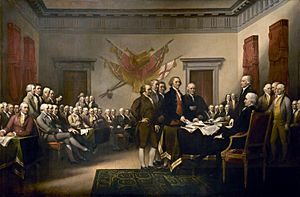
Rodney, McKean, and George Read represented Delaware in the Continental Congress. This was from 1774 to 1776. In July 1776, Rodney was in Delaware dealing with British supporters. He got a message that McKean and Read were tied on the vote for independence.
To break the tie, Rodney rode 70 miles through a thunderstorm. He arrived in Philadelphia on July 2, 1776, just as the voting started. His vote helped Delaware join eleven other states in favor of independence. The Declaration of Independence was approved two days later. Rodney signed it on August 2.
After the vote, some people in Delaware were upset. Rodney lost his election for a seat in the new Delaware government.
When his friend John Haslet died in battle, Rodney wanted to join the army. But General George Washington sent Rodney home. He needed Rodney to be Delaware's wartime governor. Rodney also became a major-general of the Delaware militia. He protected the state from British attacks. He also kept control over British supporters, especially in Sussex County.
In March 1778, Rodney was elected President of Delaware. This job was like being a governor today. Rodney was popular with the government. The Delaware militia was also loyal to him. This helped him lead the state during the war.
Rodney worked hard to find money, supplies, and soldiers for the war. Delaware soldiers fought bravely in many battles. But in 1780, the army suffered a big defeat. Rodney helped stabilize the situation. But his health was getting worse. He resigned from his office on November 6, 1781. This was just after the important Battle of Yorktown.
Rodney was elected to the United States Congress in 1782 and 1783. But he was too sick to attend. In 1783, he was elected to the Legislative Council. He was chosen as their speaker. His health continued to decline. He died before the session ended.
Death and Lasting Impact
Rodney suffered from asthma his whole life. He also had a type of cancer on his face. He tried many treatments, but they did not work. He wore a green scarf to cover his face. He died from the disease after eight years.
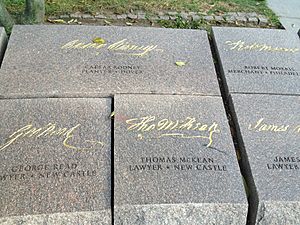
His body is buried in an unmarked grave on his farm, "Poplar Grove." This farm is known as "Byfield" today. There is a monument for him at Christ Episcopal Church. But most historians believe he is buried on his family's farm.
The Caesar Rodney School District in Delaware is named after him.
Images for kids
-
Caesar Rodney, a statue by Bryant Baker, is in the National Statuary Hall Collection.
See also
 In Spanish: Caesar Rodney para niños
In Spanish: Caesar Rodney para niños
 | Emma Amos |
 | Edward Mitchell Bannister |
 | Larry D. Alexander |
 | Ernie Barnes |


